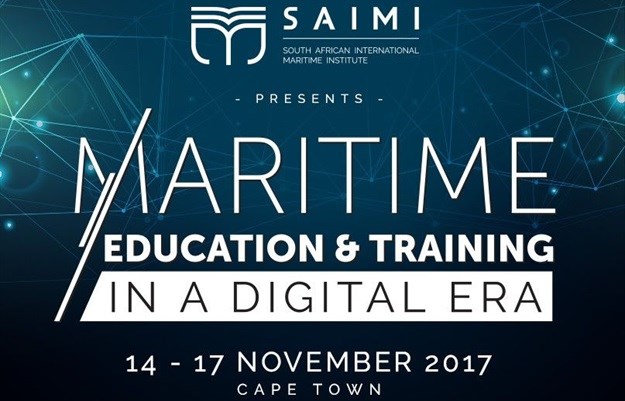The first Maritime Education and Training (MET) conference, hosted by the South African International Maritime Institute (SAIMI), will take place from 14-17 November 2017 in Cape Town.
The aim of the conference is to stimulate dialogue amongst interested stakeholders on the impact of technology on the maritime industry – and particularly what this means for delivering skills and professional development to meet the needs of a 21st century, connected and sustainable maritime sector.
The conference will provide an opportunity for stakeholders to interact and discuss the inter-linked impact and influences of technology on MET institutions, maritime businesses (manufacturers, shipping companies, service providers etc.), regulators and authorities, and those working in the sector. The aim is to find solutions for MET in South Africa that are relevant to local conditions and based on international best practice in a global industry.
Key themes:
- National and international legal frameworks for maritime education and training
- Technology developments in maritime industry, and the MET response
- Generation Alpha – how to attract and train current youth for a career at sea in future: autonomous vessels, connected ships, fleet management centres etc.
- Cyber security in this digitalised age, and how to train for prevention
Call for papers
Papers addressing one or more themes are invited. The following are suggested issues of interest for the different stakeholder groups:
MET institutions:
- Portability – technology developments enabled by blended learning.
- Simulation – new web-based simulation (with online tutorials) and virtual reality simulation technology that require a new pedagogy for curricula content and delivery methods. The use of simulator-based competency assessments, in conjunction with formal Level III assessments by maritime authorities, has the potential to enhance the quality of candidate assessment.
- E/Blended learning – The growth and increasing acceptance of this method of content delivery are exemplified by the massive open online courses (MOOC) concept, pioneered by certain U.S.A “Ivy League” universities.
Manufacturers:
Maritime technology-based companies: continuation of developing new concepts/solutions that have potential to change the way the industry can operate. Examples include:
- The “Harmonised System of Integrated Solutions” developed by Transas that includes integrated ship systems that in turn enable remote monitoring and management of vessel operations through its fleet operations system.
- Kongsberg’s Kognifai – merging the technology, knowledge and efforts across the company’s business units. The aim is to help customers to take full advantage of the opportunities offered by the digitalization of industry, the internet of things, automation, and robotics, with Kognifai expanding the boundaries of the industry by acting as a single digital platform for all data produced across the technology spectrum.
- DNV-GL’s Lumina - building trust in data and creating data security for the industry’s digital transformation.
Regulators/authorities:
The pace of change in technology development poses challenges for regulators, with increasing pressure on the resources and time needed to develop regulatory frameworks. This is illustrated, in a maritime context, by the impact of ECDIS and the challenges faced in developing regulations to address its use (alongside paper chart systems) and associated training requirements.
Submission of abstracts
- Deadline for abstracts: Friday, 29 September 2017.
- Authors of accepted abstracts will be informed by Friday, 6 October 2017.
- Deadline for full papers of accepted abstracts: Friday, 20 October 2017.
